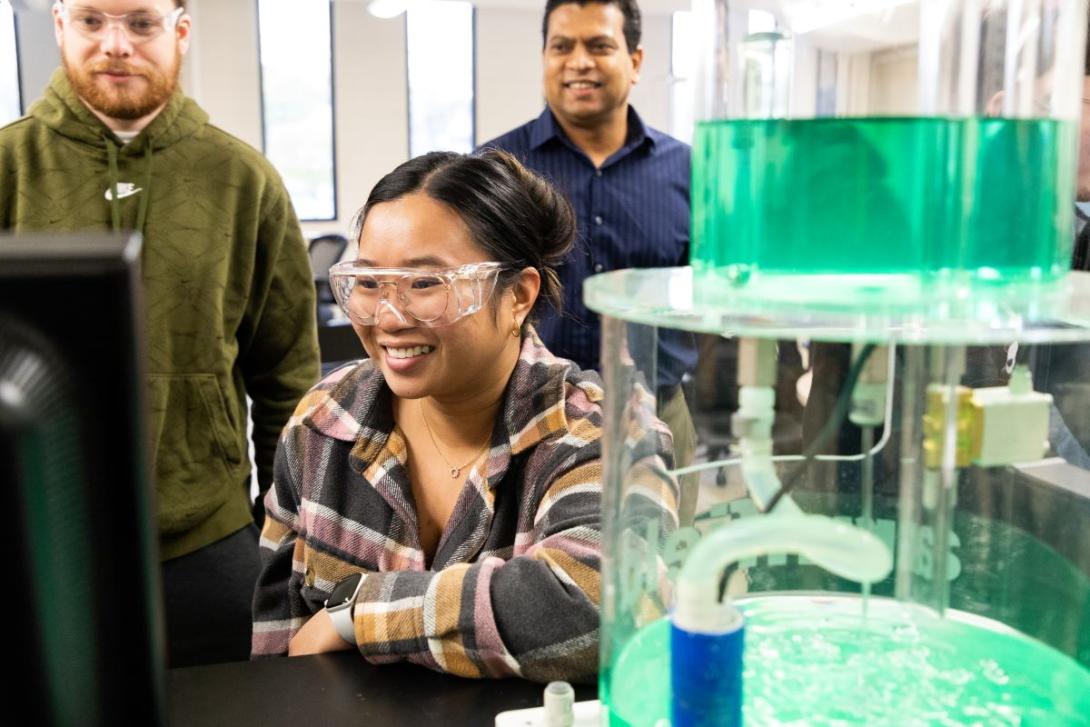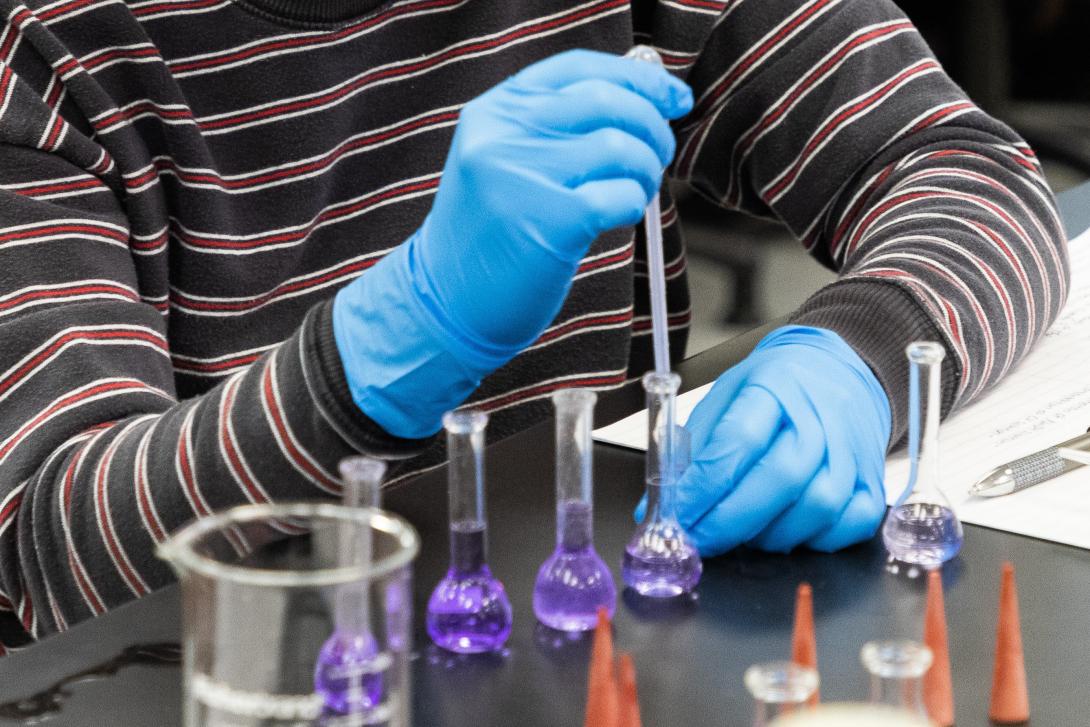Department of Chemical Engineering and Materials Science
Make Lives Better: Study Chemical Engineering and Materials Science at Kettering
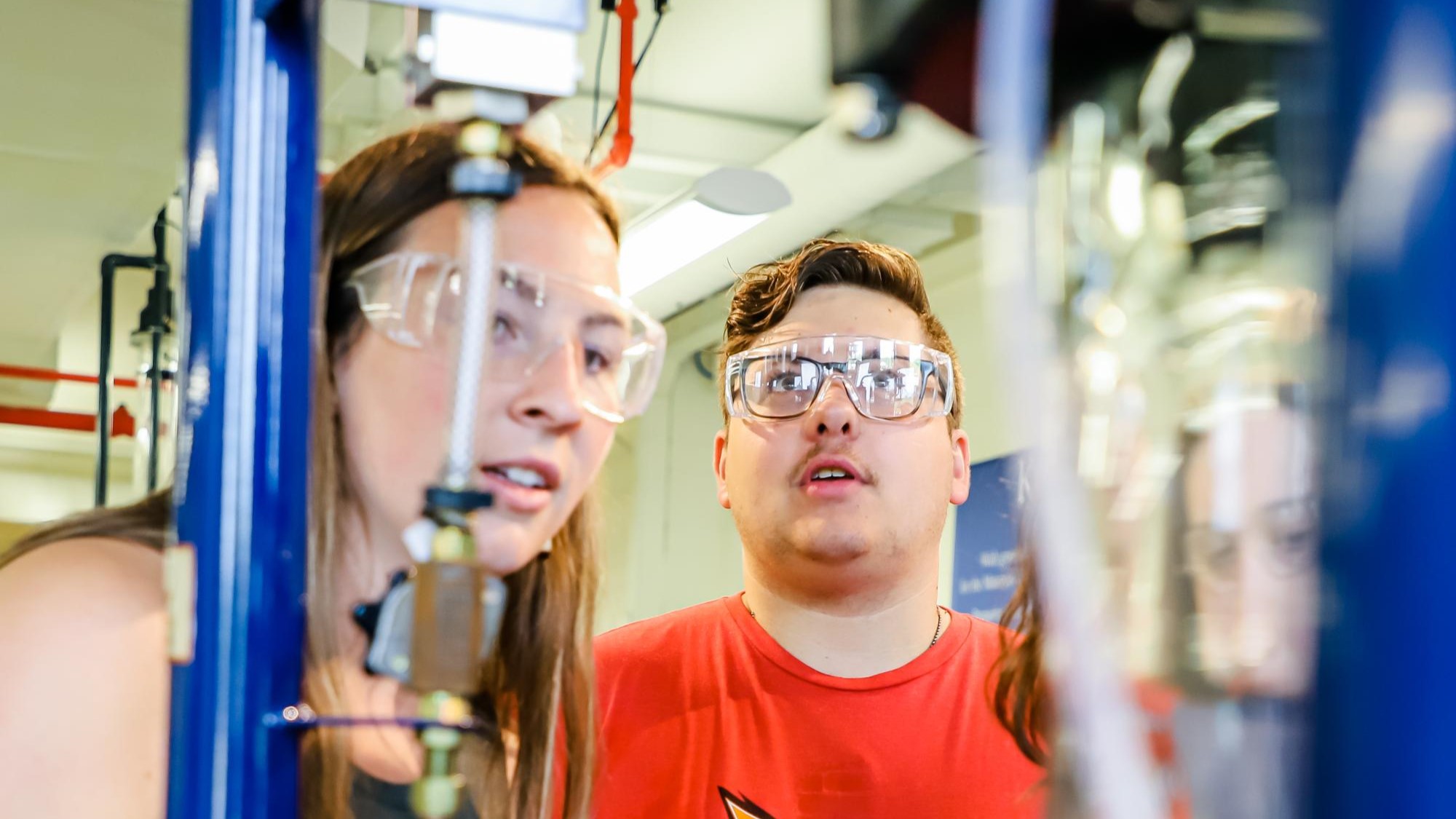
Innovate. Engineer. Build the Future.
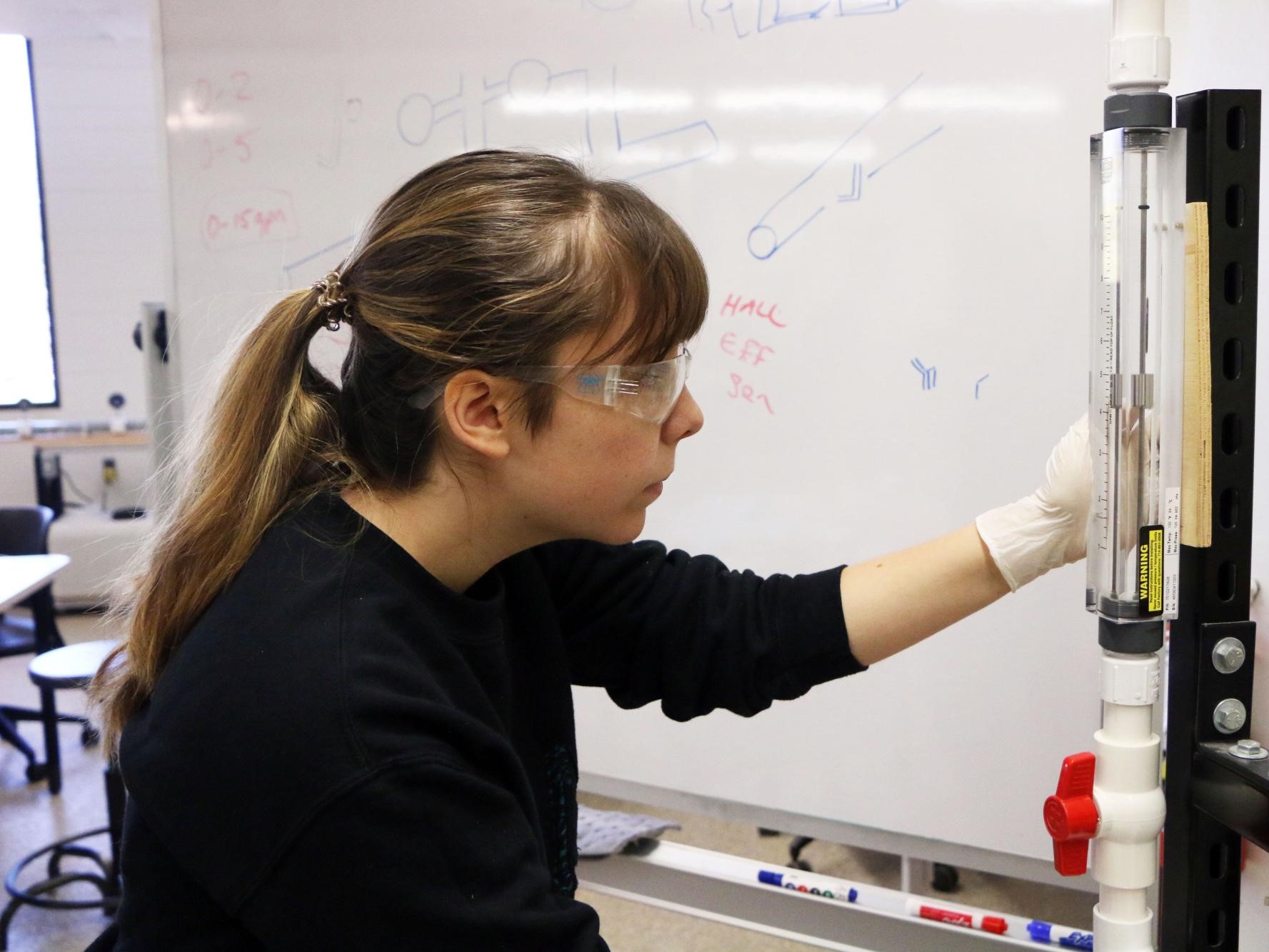 At Kettering University, our Department of Chemical Engineering and Materials Science prepares you to solve the world’s challenges through innovation and hands-on experience.
At Kettering University, our Department of Chemical Engineering and Materials Science prepares you to solve the world’s challenges through innovation and hands-on experience.
Whether your passion lies in sustainable materials, semiconductor technology, or chemical process design, you’ll find a program that empowers you to make an impact.
Addressing Global Challenges: Kettering’s Chemical Engineering and Materials Science Programs
Through intense coursework, hands-on labs, and paid Co-op employment, you’ll learn to design the materials, processes, and systems that power modern life. You’ll also explore the chemistry, physics, and engineering principles that create cleaner fuels, sustainable polymers, battery technologies, and water-treatment solutions.
Add even more depth to your degree with elective courses in areas like bioengineering, battery tech, polymers, and materials engineering. Popular minors include sustainability, manufacturing, business, computer science, pre-med, and new energy.
At Kettering, your return on investment starts right away, with real pay, real projects, and a resume that includes years of professional experience before graduation.
Degrees that Drive the Future
No matter which program you’re interested in, from our Chemical Engineering bachelor’s to our New Energy and Sustainability minors, you’ll find the program that fits your needs through our Department of Chemical Engineering and Materials Science.
Accelerated Bachelor of Science in Semiconductor Materials and Devices
From electric vehicles to high-performance computing and AI, semiconductors power the technologies shaping our world. Through this accelerated program—combined with Kettering’s signature paid Co-op experience—you’ll gain real-world experience in materials science, device design, and microelectronics.
Collaborate with industry leaders to develop advanced materials, refine chip fabrication processes, and help shape the next generation of semiconductor innovation.
Bachelor of Science in Chemical Engineering
Learn how to apply chemistry, physics, biology, and mathematics to create safer, cleaner, and more efficient processes. Kettering’s Chemical Engineering program equips you to design new products, reduce environmental impact, and improve performance across industries.
In our cutting-edge labs, you’ll collaborate with peers, work directly with industrial-scale equipment, and gain the experience needed to design and optimize the technologies that move our world forward.
About the Department of Chemical Engineering and Materials Science
The Department of Chemical Engineering and Materials Science seeks to develop engineers who pioneer the way in making our world better. Our undergraduate degree will help you develop expertise in improving materials, developing energy solutions, advancing biotechnology and medicine, and much more. As an engineering graduate from Kettering, you’ll have the opportunity to play an important role in addressing the world’s challenges and improving our everyday lives.
Wondering what else makes Kettering different? Here are a few examples:
Undergraduates get paid professional experience from Day One as they take their engineering courses. As you study, you’ll apply what you learn while working with one of our corporate partners, such as Bosch, Ford Motor Company, and GM — to name just a few.
Our combined program lets you work toward your bachelor’s and master’s degrees at the same time, so you can graduate faster — with less student debt.
The combined B.S./Master’s program fast-tracks you to leadership and advanced career opportunities. Master’s options such as the M.B.A., M.S. Engineering Mobility Systems, or the M.S. Engineering Management degrees align seamlessly with the chemical engineering undergraduate degree.
As an engineering student, you’ll gain a deep understanding of the application of materials science to their careers, specifically the link between molecular structure and real-world performance, through a sequence of unique elective courses.
You can take classes to introduce them to materials science and engineering, characterization of material properties, and applications of materials in energy applications such as batteries, fuel cells, and solar cells. In these classes, you’ll explore how metals, polymers, ceramics, and composites are designed and optimized for strength, durability, and functionality.
While you learn how to use modeling and data analysis software, study reaction rates and heat and momentum transfer, you’ll build project management and problem-solving skills. You’ll also study how costs, revenue, ROI and other factors impact chemical plant processes.
If you’re an undergraduate, you’ll join us on our Flint, Michigan, campus to earn your chemical engineering degree and experience a rich campus life in your time outside the classroom. Browse student organizations and Greek Life.
In The Lab
Laboratory experiences bring the concepts you learn in class to life: you’ll test mechanical and thermal properties, use microscopy and spectroscopy to analyze microstructures, and investigate corrosion and surface treatments. Applications span from lightweight materials for electric vehicles and advanced coatings for energy systems to polymers for healthcare and semiconductor components, giving students a strong foundation in how materials enable sustainable and high-performance technologies.
Computing in Chemical Engineering Lab: Cover computer programming basics and how they apply to chemical engineering solutions. Use advanced programs, including a powerful chemical process simulator, to formulate chemical engineering problems and develop computational solutions.
Fluid Dynamics and Heat Transfer Lab: Discover how fluid mechanics and heat transfer relate to chemical engineering by evaluating process measurements, fluid statics and dynamics, flow metering, heat exchanger design and analysis, and more. Learn about feed loop design and solutions of boundary value problems in momentum and heat transport.
Separations, Reaction and Prototyping Lab: Design, build, and demonstrate equipment prototypes as you explore the operation and optimization of chemical production using reactors. Study the separation and purification of products using distillation columns, adsorption columns, and filtration.
Materials Characterization Lab: Measure mechanical properties, optical behavior, surface chemistry, morphology, and microstructure using advanced instrumentation such as tensile testers, spectrometers, contact angle and surface analysis tools, and optical and electron microscopes. Through experiments and project work, students learn how to connect material structure to performance—an essential skill for designing stronger, more efficient, and sustainable materials for applications in energy, electronics, and manufacturing.
Materials Modeling and Fabrication: Work in state-of-the-art labs with advanced fabrication tools, Synopsys EDA simulation software, thin film and coating systems, and microchip builds in our labs.
Our Prominent Faculty Lead Kettering’s Chemical Engineering and Materials Science Programs
Our Prominent Faculty Lead Kettering’s Chemical Engineering and Materials Science Programs
At Kettering, small class sizes mean you can learn and experiment in labs and chemical engineering courses alongside our faculty — energetic and enthusiastic professors with research expertise in a variety of fields including materials engineering, alternative energy, battery technology, sustainability, and computational modeling. They’re leading experts in their fields, conducting real-world research that’s changing lives.
Our professors know that the future depends on you and want to see you succeed. They’re here to help you build the skills you need to fill critical roles in chemical engineering.
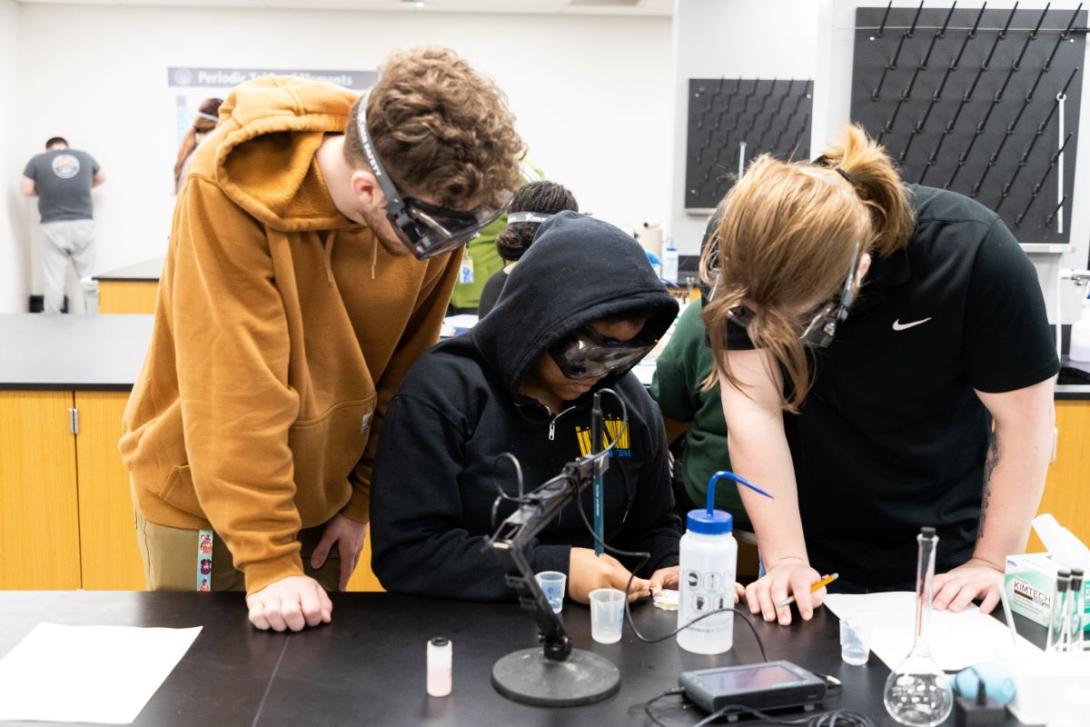
Our Chemical Engineering Programs Are Ranked and Recognized
Kettering’s chemical engineering programs are unique to Michigan — and unique to the country. Our STEM curriculum blends academic and hands-on experiences in a distinctive and impactful way.
As you earn your degree in chemical engineering at Kettering, you’ll be supported throughout your education. In addition to caring faculty, an entire team works behind the scenes to support your co-op experience: how to find lucrative opportunities, set up your resume, ace your interview, choose the right co-op for you and connect with Kettering alumni who can tell you what the real world is like.
We’re accredited by the Engineering Accreditation Commission (EAC) of ABET and honored by many publications for our dedication to quality education and innovation:
in career preparation in Data shared by CNBC in September of 2017 ranked Kettering first in Michigan among colleges and universities for producing the highest earning graduates. The Wall Street Journal ranked Kettering first in the country in career preparation. by the Wall Street Journal.
nationally in non-PhD engineering programs in 2022 by U.S. News and World Report
in the College Gazette’s Top 10 Best “Hidden Gem” U.S. Technology Schools in 2021
Be Kettering Built: Earn Your Chemical Engineering Degree
Are you ready to start your journey to earn your chemical engineering degree? We’re here to answer your questions, help you explore our chemical engineering courses and map out your future. Request more information or apply today.
